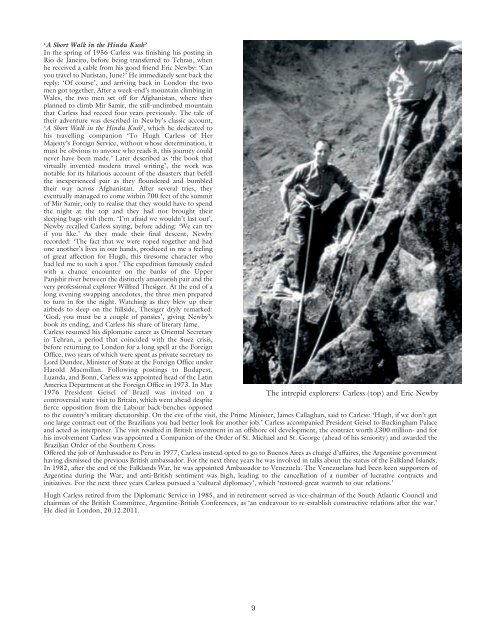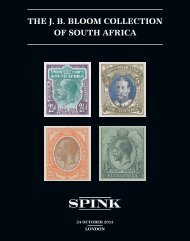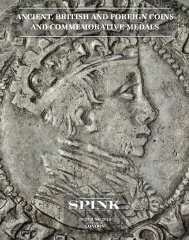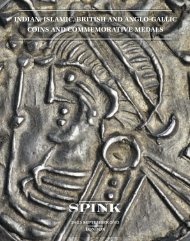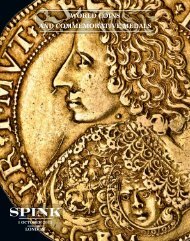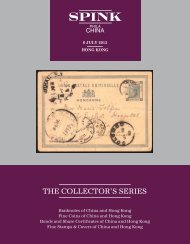orders, decorations, campaign medals and militaria - Spink
orders, decorations, campaign medals and militaria - Spink
orders, decorations, campaign medals and militaria - Spink
You also want an ePaper? Increase the reach of your titles
YUMPU automatically turns print PDFs into web optimized ePapers that Google loves.
‘A Short Walk in the Hindu Kush’<br />
In the spring of 1956 Carless was finishing his posting in<br />
Rio de Janeiro, before being transferred to Tehran, when<br />
he received a cable from his good friend Eric Newby: ‘Can<br />
you travel to Nuristan, June?’ He immediately sent back the<br />
reply: ‘Of course’, <strong>and</strong> arriving back in London the two<br />
men got together. After a week-end’s mountain climbing in<br />
Wales, the two men set off for Afghanistan, where they<br />
planned to climb Mir Samir, the still-unclimbed mountain<br />
that Carless had recced four years previously. The tale of<br />
their adventure was described in Newby’s classic account,<br />
‘A Short Walk in the Hindu Kush’, which he dedicated to<br />
his travelling companion ‘To Hugh Carless of Her<br />
Majesty’s Foreign Service, without whose determination, it<br />
must be obvious to anyone who reads it, this journey could<br />
never have been made.’ Later described as ‘the book that<br />
virtually invented modern travel writing’, the work was<br />
notable for its hilarious account of the disasters that befell<br />
the inexperienced pair as they floundered <strong>and</strong> bumbled<br />
their way across Afghanistan. After several tries, they<br />
eventually managed to come within 700 feet of the summit<br />
of Mir Samir, only to realise that they would have to spend<br />
the night at the top <strong>and</strong> they had not brought their<br />
sleeping bags with them. ‘I’m afraid we wouldn’t last out’,<br />
Newby recalled Carless saying, before adding: ‘We can try<br />
if you like.’ As they made their final descent, Newby<br />
recorded: ‘The fact that we were roped together <strong>and</strong> had<br />
one another’s lives in our h<strong>and</strong>s, produced in me a feeling<br />
of great affection for Hugh, this tiresome character who<br />
had led me to such a spot.’ The expedition famously ended<br />
with a chance encounter on the banks of the Upper<br />
Panjshir river between the distinctly amateurish pair <strong>and</strong> the<br />
very professional explorer Wilfred Thesiger. At the end of a<br />
long evening swapping anecdotes, the three men prepared<br />
to turn in for the night. Watching as they blew up their<br />
airbeds to sleep on the hillside, Thesiger dryly remarked:<br />
‘God, you must be a couple of pansies’, giving Newby’s<br />
book its ending, <strong>and</strong> Carless his share of literary fame.<br />
Carless resumed his diplomatic career as Oriental Secretary<br />
in Tehran, a period that coincided with the Suez crisis,<br />
before returning to London for a long spell at the Foreign<br />
Office, two years of which were spent as private secretary to<br />
Lord Dundee, Minister of State at the Foreign Office under<br />
Harold Macmillan. Following postings to Budapest,<br />
Lu<strong>and</strong>a, <strong>and</strong> Bonn, Carless was appointed head of the Latin<br />
America Department at the Foreign Office in 1973. In May<br />
1976 President Geisel of Brazil was invited on a<br />
The intrepid explorers: Carless (top) <strong>and</strong> Eric Newby<br />
controversial state visit to Britain, which went ahead despite<br />
fierce opposition from the Labour back-benches opposed<br />
to the country’s military dictatorship. On the eve of the visit, the Prime Minister, James Callaghan, said to Carless: ‘Hugh, if we don’t get<br />
one large contract out of the Brazilians you had better look for another job.’ Carless accompanied President Geisel to Buckingham Palace<br />
<strong>and</strong> acted as interpreter. The visit resulted in British investment in an offshore oil development, the contract worth £300 million- <strong>and</strong> for<br />
his involvement Carless was appointed a Companion of the Order of St. Michael <strong>and</strong> St. George (ahead of his seniority) <strong>and</strong> awarded the<br />
Brazilian Order of the Southern Cross.<br />
Offered the job of Ambassador to Peru in 1977, Carless instead opted to go to Buenos Aires as chargé d’affaires, the Argentine government<br />
having dismissed the previous British ambassador. For the next three years he was involved in talks about the status of the Falkl<strong>and</strong> Isl<strong>and</strong>s.<br />
In 1982, after the end of the Falkl<strong>and</strong>s War, he was appointed Ambassador to Venezuela. The Venezuelans had been keen supporters of<br />
Argentina during the War, <strong>and</strong> anti-British sentiment was high, leading to the cancellation of a number of lucrative contracts <strong>and</strong><br />
initiatives. For the next three years Carless pursued a ‘cultural diplomacy’, which ‘restored great warmth to our relations.’<br />
Hugh Carless retired from the Diplomatic Service in 1985, <strong>and</strong> in retirement served as vice-chairman of the South Atlantic Council <strong>and</strong><br />
chairman of the British Committee, Argentine-British Conferences, as ‘an endeavour to re-establish constructive relations after the war.’<br />
He died in London, 20.12.2011.<br />
9


